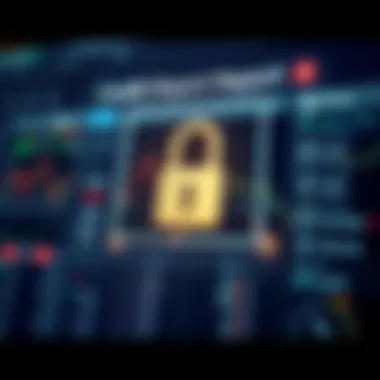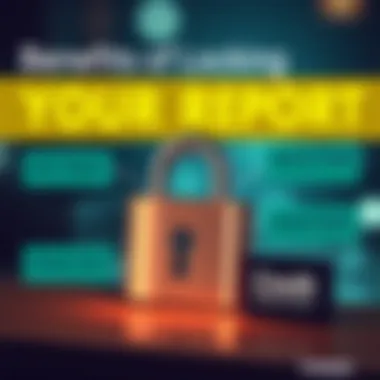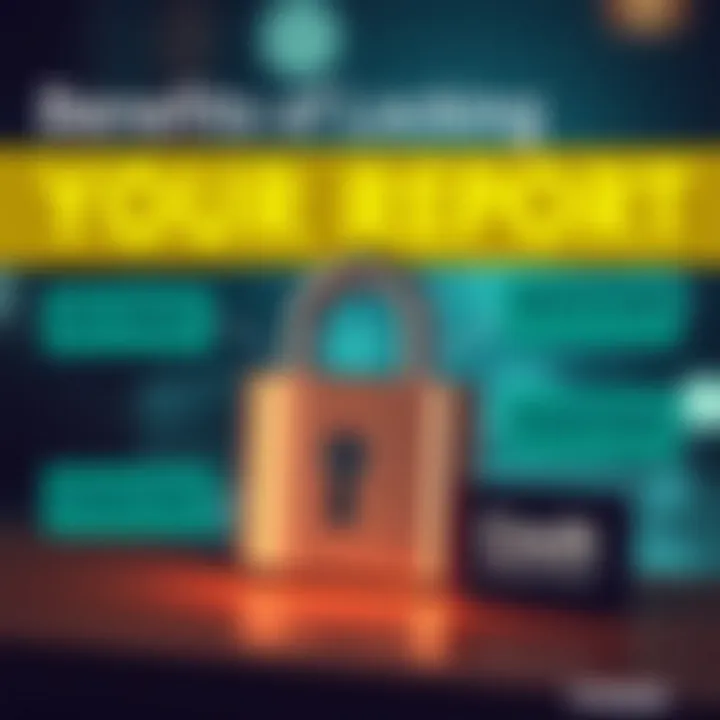Locking Your Experian Credit Report: A Complete Guide


Intro
When it comes to managing personal finances, understanding the intricacies of credit reports is essential. Your credit report can either empower you to secure loans with favorable terms or hold you back with a lower credit score. In today’s world, where identity theft and data breaches are on the rise, locking your credit report has become a pivotal step for many. This is especially true for consumers who want to safeguard their sensitive financial information. This article serves as a comprehensive guide that navigates through the labyrinth of locking your Experian credit report, examining everything from the implications of credit locks to the practical steps required for initiation and management.
Locking your credit acts as a powerful shield against unauthorized access and potential fraud. In this vast universe of financial literacy and security, it’s crucial to appreciate not just the hows but also the whys behind such an action. As we peel back the layers of this topic, we'll unpack the pros and cons of locking your credit and clarify any misconceptions surrounding the process. This is not just another piece about safeguarding your credit; it’s about taking control of your financial future.
So, let’s set the stage by diving into the fundamental terminology that can empower you in navigating your credit landscape.
Investment Terminology Breakdown
Key Terms Explained
Understanding some key terms related to credit and security can significantly enhance your grasp of the credit locking process. Here are a few crucial ones:
- Credit Lock: This is a service offered by credit bureaus, including Experian, that allows consumers to restrict access to their credit reports. Unlike a credit freeze, which requires more formal steps to lift, a lock can often be toggled on and off more conveniently through an app or website.
- Credit Report: This is a detailed account of your credit history, including debts, payment history, and overall creditworthiness. It is crucial for lenders when assessing your eligibility for loans and credit cards.
- Fraud Alert: A warning placed on your credit report to inform potential creditors to take extra steps to verify your identity before extending credit in your name.
Common Misconceptions about Locking Credit
There are a few misconceptions that tend to float around regarding locking a credit report. Let’s clear the air:
- Myth 1: Locking your credit means you'll lose access to it.
Reality: You can still view your credit report even after locking it. - Myth 2: Locking your credit is the same as freezing it.
Reality: While both prevent unauthorized access, freezing your credit usually involves more bureaucratic steps. - Myth 3: Locking your credit is expensive.
Reality: Many credit bureaus, including Experian, offer locking services for free.
"Knowledge is power, especially in finance; understanding these terms equips you to make informed decisions."
By familiarizing yourself with these key terms and misconceptions, you're well on your way to making informed decisions about locking your Experian credit report.
Understanding Credit Locks and Their Impact
In the subsequent sections, we will explore how locking your Experian credit report could influence your credit score and what this means for future lending activities. We’ll also provide actionable steps to lock your credit effectively. By knowing your options, you can navigate the complexities with confidence, allowing you to secure your financial future.
Foreword to Credit Locking
Locking your credit report is an essential topic that echoes the growing need for financial security in today's fast-paced world. As consumers find themselves increasingly vulnerable to security breaches and identity fraud, understanding the concept of credit locking becomes vital. Credit locking acts as an additional layer of protection, preventing unauthorized access to personal credit information. It's not just about protecting your credit; it’s a proactive step towards safeguarding your financial future.
Locking your credit is like putting a padlock on your front door; it restricts unwanted entry while allowing you to keep your belongings safe. When you lock your credit report with Experian, you give yourself more control over who can view your information. This vigilance can play a pivotal role in ensuring that your financial identity is secure against prying eyes.
In this section, we will dive into what a credit lock is and discuss its importance. We will explore its benefits and the considerations that ought to be taken into account when deciding whether it’s the right choice for you. With the increasing incidences of identity theft, having clear knowledge of credit locks can empower individuals, making informed decisions regarding their credit privacy.
Defining Credit Lock
A credit lock is a service provided by credit bureaus, such as Experian, that allows consumers to restrict access to their credit report. By locking your credit, you effectively prevent lenders from accessing your report, which is a crucial step in mitigating the risk of identity theft. Unlike a credit freeze—which typically requires a PIN to unlock—credit locks can be done and undone easily through a mobile app or online portal, providing a more user-friendly experience.
Credit locks can be thought of as a digital safety net. When you activate this lock, you instantly seal your credit report, ensuring that no one can open new lines of credit in your name without your authorization. This quick and easy method of securing your credit is especially beneficial for those who want to maintain control while having the flexibility to unlock their credit reports swiftly when necessary.
The Importance of Credit Locks
The significance of credit locks cannot be overstated, particularly in a world where data breaches are common. For many, they serve as peace of mind, providing a sense of security amidst growing concerns about identity theft. Here are some critical points to consider:
- Security Against Fraud: Locking your credit report can dramatically reduce the chances of falling prey to identity thieves. When your report is locked, a thief would find it tough to open new accounts in your name since they won’t be able to access your credit information.
- Control Over Personal Information: Credit locks empower you to control who gets to see your credit report. If you're applying for a mortgage or a personal loan, the lock can be lifted temporarily, allowing legitimate lenders access while keeping out unwanted gazes.
- Simplicity and Speed: The ability to lock and unlock your credit quickly, often through a simple app, makes credit locks an attractive option for those wanting to maintain flexibility. You're not bogged down by lengthy procedures typical of credit freezes.
"Credit locks are increasingly becoming the go-to solution for consumers looking to protect themselves in a digital age fraught with risk."
Overall, understanding credit locks is not merely about securing numbers and financial projections; it revolves around creating a fortress around your identity. When done correctly, this action can lead to a peace of mind that is increasingly rare in today’s digital landscape.
Experian Credit Report Overview
The significance of understanding your Experian credit report cannot be understated in today's financial climate. It's crucial not only for making informed financial decisions but also for ensuring that your credit profile accurately reflects your financial behavior. In this section, we will delve deep into the essence of the Experian credit report and how it plays a pivotal role in your credit history.
Understanding Your Credit Report


Your credit report is essentially a detailed summary of your financial history, showcasing how you’ve managed debt and credit over the years. It’s an extensive record that includes various aspects of your borrowing and repayment habits. Familiarizing yourself with your credit report is the first step toward maintaining a healthy credit score. The report contains data such as:
- Credit Accounts: Information about your active loans and credit cards, including balances and payment histories.
- Payment History: A rundown of whether payments were made on time, late payments, and defaults.
- Credit Inquiries: Records of every time your credit has been checked, which could be either hard or soft inquiries.
- Public Records: Details regarding bankruptcies, foreclosures, or tax liens that may affect your creditworthiness.
Understanding each element of this report is essential because it provides insights into how lenders perceive your financial reliability. A well-maintained credit report can facilitate obtaining favorable interest rates on loans, while a poorly managed one could lead to high borrowing costs or even denial of credit applications.
Moreover, checking your report regularly protects against fraud and identity theft. If you find unexpected items in your report, it may indicate a need for immediate action to secure your financial identity.
Components of a Credit Report
Examining the structure of a credit report reveals its intricate components. Each segment serves a vital role in forming a complete picture of your credit profile. Here’s what you can typically expect:
- Identifying Information: This includes your name, address, Social Security number, and date of birth. Accurate details are vital as they verify your identity.
- Credit Accounts: As mentioned earlier, this records the specifics of your credit utilization across different accounts. Pay attention to the total balances and your credit limits, as they directly influence your credit utilization ratio.
- Account Status: This section informs you if your accounts are current, delinquent, in collections, or inactive. Keeping an eye on this will help you identify patterns in your credit management process.
- Public Record Information: Any legal matters that impact your credit, such as bankruptcies or liens, will be chronicled here. This part is crucial for potential lenders assessing your risk level.
- Inquiries: Every time you or a creditor checks your report, it’s recorded here. Understand the distinction between hard inquiries (which can affect your score) and soft inquiries (which do not).
- Credit Score: Though some reports might not show your score, this number is a quick indicator of your credit viability. It's often beneficial to track this score alongside the detailed report.
Understanding these components gives you a tactical advantage when managing your credit. More so, knowing how each affects your creditworthiness can empower you to make proactive financial decisions.
By familiarizing yourself with these elements of your Experian credit report, you position yourself to better guard your financial future, whether you're applying for a loan, buying a house, or simply seeking to improve your economic standing. Achieving an optimal credit score is not just about avoiding pitfalls; it's about understanding your financial health in its entirety.
Why Lock Your Experian Credit Report?
Locking your Experian credit report is more than just a precaution; it’s a fundamental step in safeguarding your financial well-being. In a world where identity theft looms as a constant threat and personal information can be exploited with alarming ease, understanding the significance of a credit lock is crucial. It acts like your very own fortress; once it’s up, unauthorized parties struggle to access your information—something that can save you a world of trouble.
Protecting Against Identity Theft
Identity theft is no longer a distant concern. With hackers lurking around every virtual corner, the sensitive info that lives on your credit report can be a goldmine for wrongdoers. If someone were to gain access to your Social Security number, for instance, they could open credit cards in your name, apply for loans, or even commit fraud without your knowledge. Locking your Experian report is akin to putting a padlock on your vital information.
When your report is locked, lenders cannot pull your credit file without your express permission, making it virtually impossible for a fraudster to go on a spending spree under your name. It’s an essential boundary that gives you peace of mind, knowing that you’re taking proactive steps against identity theft, rather than playing catch-up once the damage is done.
Moreover, it’s worth noting that many are under the impression that simply checking their credit report regularly is sufficient. While being updated is important, this alone won’t prevent someone from accessing your information when they least expect it. A lock is a much more robust form of protection that actively prevents unauthorized access.
"A locked credit report is like a vault for your financial identity; it keeps intruders at bay and secures your future."
Controlling Access to Your Information
In our information-driven society, control is power. By locking your Experian credit report, you retain authority over who gets access to your personal data.
When you apply for a loan or a credit card, lenders typically pull your credit for evaluation. However, if you’ve enacted a credit lock, you dictate who gets access and when. This gives you a stronger negotiating position. Interested in a better rate? You can leverage your locked credit status to entice lenders, knowing that they have to go the extra mile to secure access.
Additionally, having the ability to easily unlock your report whenever needed provides you with agility in your financial endeavors. Need to secure a mortgage or a new credit account? Just unlock the report without lengthy hassles. That convenience is significant, especially when making timely financial decisions.
It’s crucial to remember that locking your report does not interfere with your credit score itself. The ability to manage who gets a peek at your credit history can work wonders for how you engage with lenders, making you the one in charge rather than just another statistic.
In summary, locking your Experian credit report is not just a step, but a leap towards enhancing your financial security. It curtails the risk of identity theft and elevates your control over your financial narrative, paving the way for informed and secure financial choices.
Steps to Lock Your Experian Credit Report
Locking your Experian credit report is a crucial step towards safeguarding your financial identity. It acts as a barrier against unauthorized access while allowing you control over who can view your credit information. Many individuals find themselves overwhelmed by the process, often questioning the intricacies involved from start to finish. By breaking down the steps and presenting them in a clear manner, this section aims to illuminate the pathway to securing your credit report efficiently.
Initial Preparations
Gathering Necessary Documents
Before you dive into the process of locking your credit report, gathering the necessary documents is vital. This involves collecting personal identification details such as your Social Security number, address history, and date of birth. Having these documents at your fingertips streamlines the entire locking process and ensures accuracy in your application.
One of the standout characteristics of this phase is its ability to prevent delays during the actual locking procedure. If the required documents aren’t readily available, it can result in unnecessary back and forth, diminishing the security you seek. Thus, preparing these docs isn’t just a chore; it’s a strategic move.
Moreover, the benefit here is manifold. Not only does it save time, but it also provides you peace of mind. When you're ready and organized, the likelihood of errors decreases significantly. However, be cautious with sensitive information; ensure that it’s stored securely while working towards locking your credit report.
Creating an Online Account
The next crucial step is creating an online account with Experian. This is where your journey into locking your credit begins. The way this process works is fairly straightforward and user-friendly, which is why it’s a favored choice among many users.


By establishing an account, you unlock the capability to manage your credit report effectively. This includes locking or unlocking your report as needed, giving you control at your fingertips. A unique feature of having an online account is the ability to monitor your credit health. Users can easily check any changes, disputes, or notifications relevant to their credit status.
However, like any digital process, there are potential drawbacks. It’s imperative to maintain account security, as creating an online presence may expose you to cyber threats. Thus, employing strong, unique passwords and employing two-factor authentication can help mitigate risks. In summary, the creation of an online account is a step that not only aids in the locking process but also offers ongoing management of your financial security.
Locking the Report via Online Portal
Now that you have your documents ready and an account set up, locking your report via the online portal is the next logical step. This method is often regarded as the most efficient. Once logged into your Experian account, locate the option to lock your credit report. This process typically involves a few easily navigable screens guiding you through your personal information verification.
After confirming your identity, the system will execute the lock almost instantaneously. Compared to other methods, the online portal provides real-time feedback, making it a seamless experience. Users appreciate the clarity presented throughout the process, allowing them to understand precisely what steps to take next.
Using the Mobile App for Credit Lock
If you prefer managing your credit on the go, the Experian mobile app presents another practical alternative. With the app, you can lock your credit report anytime, anywhere. This integrates well into the lifestyle of those who are always on the move.
The mobile app offers the same functionalities as the online portal, but it adds a layer of convenience. Opening the app and navigating to the lock feature can be done with just a few taps on your smartphone. It may even include alerts and notifications, keeping you informed about your credit status in real time. The major advantage here is accessibility; it bridges the gap for users who may not have constant access to a computer but need to manage their credit diligently.
In essence, utilizing the mobile app enhances the locking experience, as it connects security with your everyday life. As with any tech, remember to keep your app updated and activated with robust security measures to ensure that your personal information remains safeguarded.
Managing Your Credit Lock After Activation
Once you've gone through the process of locking your Experian credit report, the next chapter opens up: managing that lock effectively. It’s like securing your front door but needing to keep an eye on who’s coming to knock. Establishing a credit lock doesn’t mean it’s set and forget; rather, it demands a proactive approach to ensure your information stays safe while allowing access when necessary. In this section, we will delve into essential aspects like unlocking your credit report and the importance of monitoring your credit report regularly.
Unlocking Your Credit Report
Managing your credit lock often involves unlocking your report for various reasons. This can encompass applying for new credit or making significant purchases like a home or car. It’s crucial to understand how to handle these situations due to the repercussions if mishandled.
Stipulations for Unlocking
Unlocking your credit report comes with certain stipulations that need to be considered. When you request an unlock, there are verification procedures that Experian will follow to ensure it’s really you making the request. This might include providing access to the very same documents and information you used while locking your credit. For instance, they may need your personal identification number (PIN) or password, which was created during the lock process. Knowing these requirements will save you from unexpected hurdles down the line.
"Understanding the stipulations for unlocking your credit report can pave the way for smoother credit-related transactions, ensuring you're not caught off guard."
One of the key characteristics of these stipulations is that they prioritize security. By mandating verification, Experian helps prevent unauthorized access, ensuring that even if someone tried to impersonate you, they’d be met with a closed door. Though securing your financial future may require more steps, it’s a trade-off for enhanced safety.
Timeframe for Unlocking
Now, let’s talk about the timeframe for unlocking your credit report. Depending on your method of unlocking—whether it’s via the online portal or mobile app—the duration can vary. Some may even be instantaneous, while others could take longer due to processing requirements. Knowing this can influence how timely you need access to credit.
Understanding the time it takes to unlock your report can sound trivial, but it’s pivotal, especially in scenarios where timing is critical, such as a house closing or car purchase. If you’re racing against the clock, having that knowledge could result in lining up your application appropriately, avoiding unnecessary delays.
Ultimately, keeping an eye on the timing adds another layer to your financial planning. Ensure you know when you need to unlock well in advance of any deadlines to maintain peace of mind and confidence in your dealings.
Monitoring Your Credit Report
After locking your credit report, continuous diligence in monitoring remains essential. Even though your report is locked, it doesn’t eliminate the need for regular checks. Monitoring your credit is akin to having a security system in place to catch any anomalies or suspicious activity.
A solid monitoring approach can alert you to any changes that might affect your financial standing, whether it’s an error in your report or a sign of identity theft. Delving into credit monitoring services can provide additional insights and alerts, allowing you to act swiftly should any discrepancies arise.
In essence, actively managing your credit lock reinforces your financial security. Whether unlocking for new credit or keeping your head above water with monitoring services, being proactive lends you the upper hand in safeguarding your financial future.
Potential Impacts of Locking Your Credit Report
Locking your Experian credit report can have significant implications for your financial journey. It serves as a safeguard against unauthorized access while also bringing a few considerations to the forefront. This section dives into those impacts, elucidating both the benefits and drawbacks involved in this process.
Impact on Credit Applications
When you decide to lock your credit report, it directly influences how you approach new credit applications. Lenders usually conduct a hard inquiry on your credit report to assess risk factors before approving loans or credit lines. However, if your report is locked, they won't be able to see your credit history, potentially leading to delays or outright denials of credit requests.
It's crucial to be aware of the implications:


- Delayed Approval Process: If you're in the midst of securing a loan—say for a home—locking your report can push timelines back. Lenders may request you unlock the report just to proceed, causing stress during an already taxing process.
- Increased Chances of Denial: Some lenders might simply reject your application without additional steps if your report remains inaccessible. This can be especially relevant for less conventional lenders who cannot be bothered to deal with the unlocking process.
"Considere the potential outcomes when deciding to lock your credit—sometimes, being too protective can hamper your financial movement."
Effects on Credit Scores
Your credit score isn't directly affected by locking your credit, but that doesn't mean it doesn’t influence your broader financial health. Here are a couple important points to consider when evaluating how credit locks might indirectly affect your score:
- Limited Access to New Credit: With a blocked access, you might miss opportunities for new credit that could improve your utilization rate and hence your score. For example, if you see a limited-time offer on a new credit card with lucrative benefits, being unable to apply due to a locked report could mean missing out on boosting your creditworthiness for future loans.
- Consistent Monitoring Is Key: A credit lock offers peace of mind, yet it doesn’t replace the need for monitoring your credit score. Lenders often check your credit scores alongside the report—if they find that your score has not improved or diminished during your periods of inactivity, they might be less inclined to issue credit. Regularly assessing your score helps you stay on top of changes while solidifying your financial strategy.
In summary, locking your Experian credit report can shield you from identity theft but comes with its own set of considerations. Balancing security with access to credit can help you navigate through the complexities of financial planning with a sturdy approach.
Common Misconceptions about Credit Locks
Credit locks often confuse many individuals. With all the noise surrounding credit security, it’s vital to separate facts from fiction. Not understanding credit locks can lead to mistakes that affect your financial health. This section aims to clarify common misconceptions, enabling readers to grasp the importance of locking their Experian credit report in a well-informed manner.
Credit Locks vs. Credit Freezes
Firstly, folks often conflate credit locks and credit freezes, thinking they’re the same beast. While both mechanisms serve to protect your credit from identity theft and unauthorized access, they operate differently.
- Credit Lock is generally more user-friendly. It's easily managed through a mobile app or online account, allowing users to lock and unlock their reports at will. It's akin to having a lock on your car but retaining the key to access it quickly when needed.
- Credit Freeze, on the other hand, is more rigid and requires contacting each credit bureau individually. It involves more paperwork and can take several days to implement or remove. Think of it as a more advanced safeguard where access is more restricted—like a security system that’s on high alert.
Many people believe that a lock is as secure as a freeze, but there are cases where unauthorized users could slip through the cracks if a lock isn't managed properly. Making a choice between them hinges on individual needs for flexibility versus strict security.
Understanding the Limitations
Every tool has its limits. A common myth is that locking your credit report guarantees complete protection against identity theft. It's crucial to emphasize that while locking your credit report significantly reduces risk, it doesn’t eliminate it entirely. Here are some important points to consider:
- Limited Scope: A credit lock applies only to your credit report at the company you locked it with, like Experian. It doesn’t cover other financial institutions or businesses that might access your information.
- Not a Substitution for Vigilance: Even with a locked report, consumers should proactively monitor their accounts for suspicious activity. Identity thieves can still access other personal information through means unrelated to credit reports.
- Enforcement: If your information was stolen before you locked your credit report, the damage could already be done. Locks don’t reverse actions taken by identity thieves in the past.
- Temporary Release: Releasing a lock for a lender to review your report is straightforward, but it can expose you temporarily, leaving a window for fraud if not careful.
In summary, while credit locks are a handy tool for managing credit security, understanding the limitations they come with is equally important. This knowledge will empower individuals to use locks more effectively, blending them with other security measures to create a more comprehensive protection strategy.
"Misunderstanding the nature of locks can lead to repercussions that linger long after the mistake is made."
To conclude, individuals must educate themselves about the real capabilities of credit locks versus freezes and titillate their knowledge about their limitations. For more information on these topics, resources like Consumer Financial Protection Bureau and Experian can provide comprehensive insight.
Alternatives to Locking Your Credit Report
Exploring alternatives to locking your Experian credit report is crucial in understanding your credit options. While locking offers a layer of security, it is not the only route individuals can take to manage their credit risk. By recognizing alternative methods, such as credit freezes and monitoring services, you gain a wider perspective on protecting your financial identity and assets.
Credit Freeze Procedures
A credit freeze is often touted as the gold standard in consumer protection. Unlike a credit lock, which generally requires you to engage with your credit report directly through a specific service, a credit freeze can be imposed by you without relying on third parties. The process usually begins at the three major credit bureaus: Equifax, Experian, and TransUnion. Here’s a snapshot of how you can initiate a credit freeze:
- Request Online or Via Mail: Each credit bureau provides pathways to request a freeze either online or by submitting a written request. Visiting their respective websites can save time.
- Provide Personal Information: You’ll need to provide detailed personal information, such as your name, address, Social Security number, and birth date, to verify your identity.
- Receiving a Confirmation: Once your request is processed, you will receive a confirmation containing a PIN or password. This will be essential for lifting the freeze in the future.
- Freezing All Three Bureaus: Remember, a freeze at one bureau does not extend to the others. It’s important to freeze your credit reports separately.
In summary, a credit freeze is free of charge and serves as a robust way of barring creditors from accessing your report without your express permission. However, it’s crucial to understand that unlike credit locks, which allow for easier management through specific portals, lifting a freeze can take longer, particularly if it's done by mail.
Monitoring Services
While a credit freeze or lock is a great barricade against identity theft, monitoring services can be likened to having a security system that alerts you to potential unauthorized activity. These services continuously watch over your credit report and alert you to changes, such as new accounts opened in your name or credit inquiries that you did not authorize.
Benefits of Monitoring Services:
- Real-Time Alerts: Most services provide instant notifications when major changes occur in your credit profile. This immediacy allows you to take action swiftly.
- Financial Health Tracking: Many monitoring services offer tools and resources to help you understand your credit score trend, thereby improving your financial planning.
- Identity Theft Insurance: Some services come with policies that protect you financially in the event of identity theft, assisting with legal fees, lost wages, and even personal expenses.
However, it’s worth mentioning that while monitoring services can be an excellent safety net, they do not prevent identity theft from happening. They are more about detecting issues early rather than blocking them outright.
Epilogue
Locking your Experian credit report is more than just a safety blanket; it's a proactive measure in an age where identity theft has become alarmingly common. As explored throughout this article, the implications of a credit lock are not just about restricting access to your information. It's a strategic move that empowers you to manage your credit security without the concern of unauthorized activity.
Summarizing Key Takeaways
In our discussion, several key points emerge that are crucial for understanding the process of locking your credit. These include:
- A credit lock offers immediate protection against unauthorized access to your personal information. This simple action can deter would-be identity thieves.
- Locking your credit does not affect your credit score; it merely regulates who can access your credit file. This ensures that you remain in control of your financial narratives.
- The process of locking and unlocking is straightforward; however, it requires careful attention to set up. Make sure to gather all necessary documents beforehand.
- Stay informed about the differences between credit locks and freezes, as both serve distinct purposes—this will guide your decision on which is right for you.















